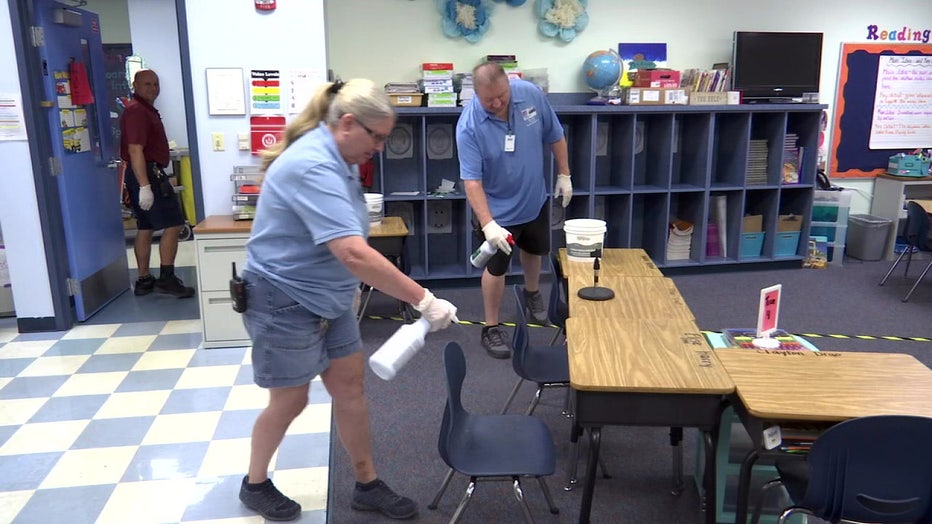Florida's public schools should reopen this fall, governor says
MELBOURNE, Fla. - Florida Gov. Ron DeSantis says he expects to see the state’s public schools open this fall, and he joined his education commissioner to unveil his vision for that process Thursday.
Speaking in Melbourne, the governor explained that he’s been working with Commissioner Richard Corcoran, the Board of Education, and superintendents around the state to divvy up funds from the CARES Act as part of a plan to help students return to on-campus learning.
“Getting back on our feet in the school year is going to be really important for the well-being of our kids, but I think it’s going to be important for our parents, who have had to juggle a lot over the last few months,” DeSantis said.
RELATED: More details emerge on plans to reopen Florida's universities
Florida’s public schools transitioned to online learning during the spring break period earlier this year in order to slow the spread of the COVID-19 pandemic. Some counties experienced technical glitches as they figured out how to roll out virtual classes, while the state waived school testing requirements and other traditional metrics.
DeSantis praised the school districts’ efforts Thursday, but Corcoran warned of “significant long-term harm” for students who were on the wrong side of the achievement gap.
“The message should be loud and clear with a strong recommendation to the great superintendents that we work with: We want schools fully open in the fall because there is no better way to educate our students,” he stated.
The announcement came on a day of record coronavirus cases in the state. Nearly 1,700 new cases were reported Thursday, the largest single-day increase and the ninth day in a row with around 1,000 or more cases.
RELATED: Nearly 1,700 new Florida coronavirus cases reported Thursday; largest single-day increase
The plan includes guidance on disinfecting and social distancing. Corcoran said there was “an extremely low risk, not just of contracting [the virus] but also spreading it” at schools, but the governor did leave the door open for local officials to make their own decisions about schools as the pandemic continues.

A school in Manatee County is cleaned to prevent the spread of COVID-19 earlier this year.
“We believe those are locally driven decisions,” DeSantis said. “We believe what that looks like may look different in Brevard than it does in Miami-Dade than it does in Baker County. So we want to empower not just the superintendents but the local all the local stakeholders to be able to craft a solution that makes the most sense for that area.”
RELATED: Study: Many more kids infected with COVID-19 than generally known
The governor’s plan includes the following details:
$64M to close achievement gaps that have likely been exacerbated during the pandemic.
$20M to engage school districts in identifying and adopting the best reading curriculum to drive teaching and learning from grades K-3.
$15M to train and develop 2,000 highly effective reading coaches, develop strategies for in-classroom reading coaches.
$223M for early learning programs. This includes $55M to childcare providers with costs to maintain a safe learning environment.
$16.9M to childcare providers who agree to re-open as part of Florida schools re-opening plan.
$20.9M in funding for successful transition to kindergarten programs, to implement summer programs for 45,000 rising kindergarten children with literacy struggles.
$45M set aside as safety-net funds to ensure children don’t continue to have disruptions in their education. The funds include up to $30M to protect tax credit scholarships.
$8M to allow every public school student graduating in the 2020-2021 to take the ACT or SAT free of charge.
$5M to expand civic literacy in our schools.
$35M to increase capacity around short-term, in-demand technical certificate programs, market-driven and clock-hour career certificate programs, and preparation courses, at the state’s 28 state colleges, and 48 technical colleges.
$10.9M for career and technical education equipment grants to support K-12 post-secondary career courses. this plan also includes help and recommendations for education community.
$2M for increased telehealth services for students experiences difficulties during this time.

Children are undercounted in COVID tally, study says
A study out of the University of South Florida says that the number of children infected by COVID-19 is likely far greater than what's being reported.


